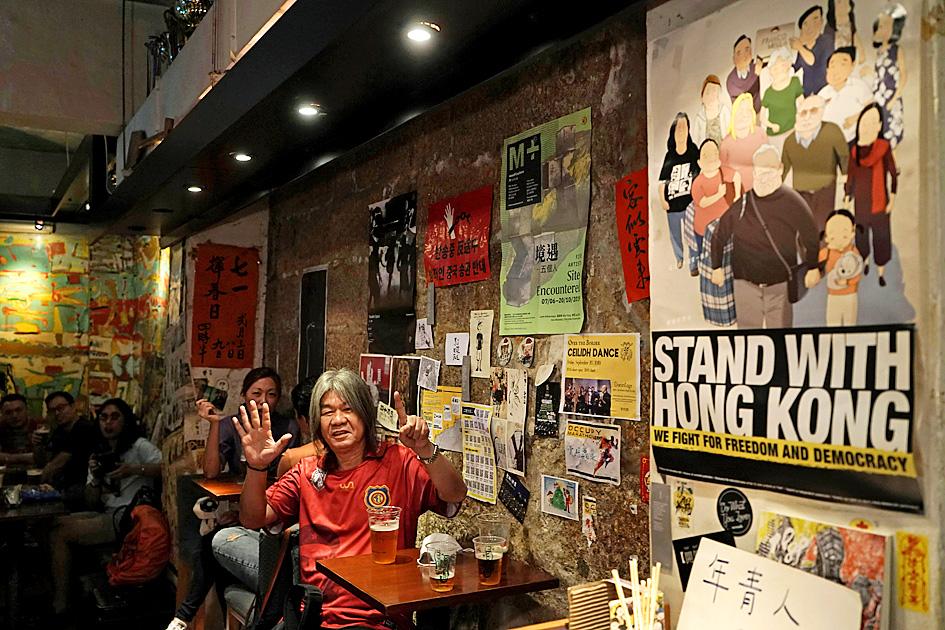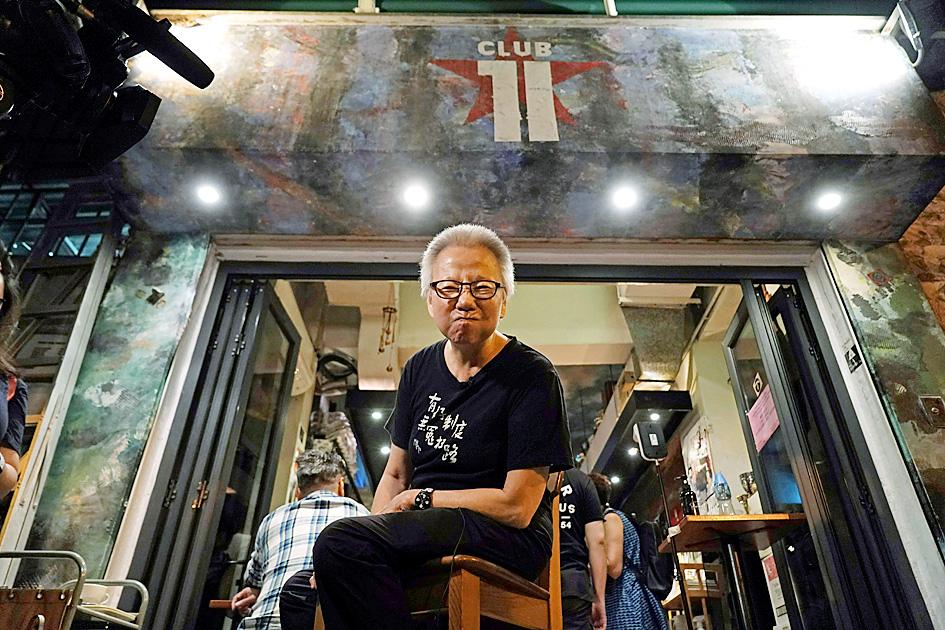Nearly 15 years ago, Grace Ma (馬麗華) decided to name her bar Club 71, in commemoration of a July 1, 2003, rally where hundreds of thousands of Hong Kongers protested a proposed national security law for the territory.
“I took the name Club 71, because somehow it is more hopeful, with half a million Hong Kong people having a demonstration, a rally, to stand for themselves, not to ignore what’s going on in Hong Kong,” Ma said.
For years, the storied bar has served as a watering hole for the city’s pro-democracy activists and intellectuals, who could freely engage in discussions over a round of beer or two.

Photo: AP
Warning: Excessive consumption of alcohol can damage your health
Then the COVID-19 pandemic hit and, in a blow to the territory Western-style freedoms, the central government in Beijing in June imposed sweeping national security legislation targeting political expression in response to massive anti-government protests last year.
For Ma, the troubles meant it was time to shutter the business for good. Months of government-mandated bar closures as part of COVID-19 restrictions had pushed Club 71’s finances deeper into the red, and operating the bar no longer made financial sense, she said.
The bar will close at the end of this month.

Photo: AP
“We have closed for three months, out of the past six months,” said Ma, who is in her 60s. “For our business, it’s impossible.”
Social distancing restrictions have also halved the capacity of the territory’s bars and restaurants, making it more difficult for them to turn a profit.
In the last days of the bar, customers have shown up in force, gathering outside in the park and occasionally milling in and out as they order pints of beer.
The colorful interior walls are plastered with posters advertising art exhibitions and performances, as well as pro-democracy artwork.
“This is a place in Hong Kong where people can drop by and exchange ideas, as long as everyone respects each other, they can say whatever they want,” Ma said.
News of the bar’s imminent closure was disappointing for some of its regulars, who cherished the unique atmosphere and the mix of people.
“There are very few bars of this kind in Hong Kong. We call it the quiet bar, which allows people to chat with each other,” said Keung Fung, 41, another loyal patron and a former student union representative.
“It is very unfortunate,” he said. “I’ll need to look for another bar with similar atmosphere.”
Some of Club 71’s customers also include former lawmaker and pro-democracy activist Leung Kwok-hung (梁國雄), known as “Long Hair,” who had been a regular in Club 71’s predecessor, Club 64.
Ma had also run Club 64, before a skyrocketing rent forced her to move to her current location in the Sheung Wan neighborhood. It was then that she renamed the bar to Club 71.
“It is a hub for everyone to connect and communicate with each other, sometimes sit around and discuss what to do. So you can say it’s a meeting point,” said Leung, who had visited the bar for a beer.
Other famous bargoers over the years included Hong Kong singer-activist Denise Ho (何韻詩) as well as acclaimed filmmaker Christopher Doyle.
Although Ma is saddened at having to close Club 71, in some ways it is also a relief, she said.
“Financially, I really couldn’t hang on,” she said. “It’s time to move on, I want to do something else.”

‘IN A DIFFERENT PLACE’: The envoy first visited Shanghai, where he attended a Chinese basketball playoff match, and is to meet top officials in Beijing tomorrow US Secretary of State Antony Blinken yesterday arrived in China on his second visit in a year as the US ramps up pressure on its rival over its support for Russia while also seeking to manage tensions with Beijing. The US diplomat tomorrow is to meet China’s top brass in Beijing, where he is also expected to plead for restraint as Taiwan inaugurates president-elect William Lai (賴清德), and to raise US concerns on Chinese trade practices. However, Blinken is also seeking to stabilize ties, with tensions between the world’s two largest economies easing since his previous visit in June last year. At the
Nearly half of China’s major cities are suffering “moderate to severe” levels of subsidence, putting millions of people at risk of flooding, especially as sea levels rise, according to a study of nationwide satellite data released yesterday. The authors of the paper, published by the journal Science, found that 45 percent of China’s urban land was sinking faster than 3mm per year, with 16 percent at more than 10mm per year, driven not only by declining water tables, but also the sheer weight of the built environment. With China’s urban population already in excess of 900 million people, “even a small portion

UNSETTLING IMAGES: The scene took place in front of TV crews covering the Trump trial, with a CNN anchor calling it an ‘emotional and unbelievably disturbing moment’ A man who doused himself in an accelerant and set himself on fire outside the courthouse where former US president Donald Trump is on trial has died, police said yesterday. The New York City Police Department (NYPD) said the man was declared dead by staff at an area hospital. The man was in Collect Pond Park at about 1:30pm on Friday when he took out pamphlets espousing conspiracy theories, tossed them around, then doused himself in an accelerant and set himself on fire, officials and witnesses said. A large number of police officers were nearby when it happened. Some officers and bystanders rushed

Beijing is continuing to commit genocide and crimes against humanity against Uyghurs and other Muslim minorities in its western Xinjiang province, U.S. Secretary of State Antony Blinken said in a report published on Monday, ahead of his planned visit to China this week. The State Department’s annual human rights report, which documents abuses recorded all over the world during the previous calendar year, repeated language from previous years on the treatment of Muslims in Xinjiang, but the publication raises the issue ahead of delicate talks, including on the war in Ukraine and global trade, between the top U.S. diplomat and Chinese